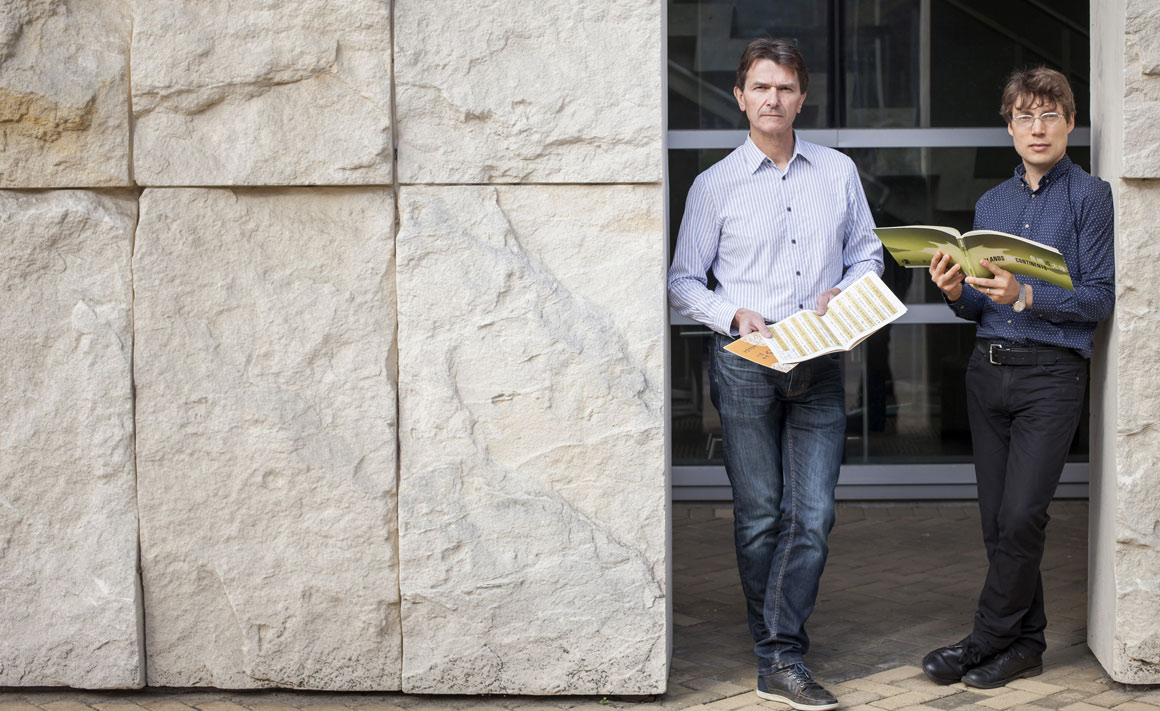
Two Otago academics share a special interest in the influence of Asia on contemporary Kiwi culture.
Professor Henry Johnson (Music) and Associate Professor Jacob Edmond (English and Linguistics) are joint founding directors, with Associate Professor Jacqueline Leckie, of the Asian Migrations Research Theme.
The pair also recently co-edited a special “Asia in New Zealand Lives” issue of the New Zealand Journal of Asian Studies, illustrating the relationship between Asia and New Zealand through individual stories of influential New Zealanders.
Johnson has a scholarly and a player's interest in Asian music. He studied and performed Asian music while at university in the United Kingdom. The ensemble of instruments he plays includes Indian sitar, Indonesian gamelan percussion, Japanese stringed koto and Japanese taiko drums; he did fieldwork in Japan for his doctorate on the anthropology of music.
Soon after arriving in New Zealand in 1995, Johnson established a gamelan ensemble at Otago, to celebrate musical diversity within the Department of Music. He also formed and plays in a Japanese koto ensemble and in a Japanese taiko group, with mostly non-Japanese performers.
Johnson says that taiko has become well known in New Zealand, with a number of community music groups, and is positively influencing how the performers perceive Japan – and how Japanese perceive New Zealand.
He points to the New Zealand composer and ethnomusicologist, Jack Body, who died in May, as a prime example of the influence of Asia on New Zealanders and their music.
“He was one of the first New Zealanders to go to Asia and to bring back a passion for cultural and musical diversity.
“That open mindedness, that eclecticism, is an absolute model of how music can teach you how to comprehend and appreciate cultures other than your own.”
Johnson says that Body not only incorporated elements of Asian – and particularly Indonesian –music in his own compositions, but also worked with Asian musicians already in New Zealand and was responsible for Asian musicians visiting the country to perform, teach and collaborate.
Johnson has made a special study of Body's life and work, and contributed an article on the composer to the New Zealand Journal of Asian Studies' special issue.
While Johnson's focus is music, Edmond has a passion for poetry. He specialises in modern poetry written in English, Russian and Chinese, and is particularly interested in cross-cultural exchanges as they relate to the East Asian region.
“One of my areas of interest is how culture internationally is being transformed by increasingly rapid movements of people, goods and ideas,” Edmond explains.
He recently contributed a book chapter on the surprising range of Chinese-language literature in New Zealand.
“There is a long history of writing in Chinese in New Zealand going back to Otago gold diggers in the 19th century who entered poetry competitions run out of Sydney by a Chinese newspaper,” Edmond says.
More recently, two celebrated Chinese poets, Yang Lian and Gu Cheng, lived in New Zealand and taught at Auckland University. (Gu tragically killed himself and his wife on Waiheke Island in 1993.)
Edmond says that Yang was living in Auckland at the time of the 1989 Tiananmen Square massacre, and sought leave to stay and eventually became a New Zealand citizen.
“Though he now lives in London and returns frequently to China, his Auckland writings reflect his time as an exiled poet writing in a strange country in which people spoke a strange language.”
Edmond, who did his PhD on Yang and two other poets, has co-edited and co-translated a collection of poems and prose written while Yang was in New Zealand.
“In some ways this is New Zealand poetry, even though it is written by a person who is widely identified as a major Chinese poet. These poems are very much rooted in specific places in Auckland, like the Symonds Street Cemetery and Grafton Bridge.”
Edmond wrote about some of these works in his recent book, A Common Strangeness, as an example of the cross-cultural encounters of poetry in exile.
FUNDING
- Asia New Zealand Foundation
- Kagoshima University
- Royal Society of New Zealand
- University of Otago